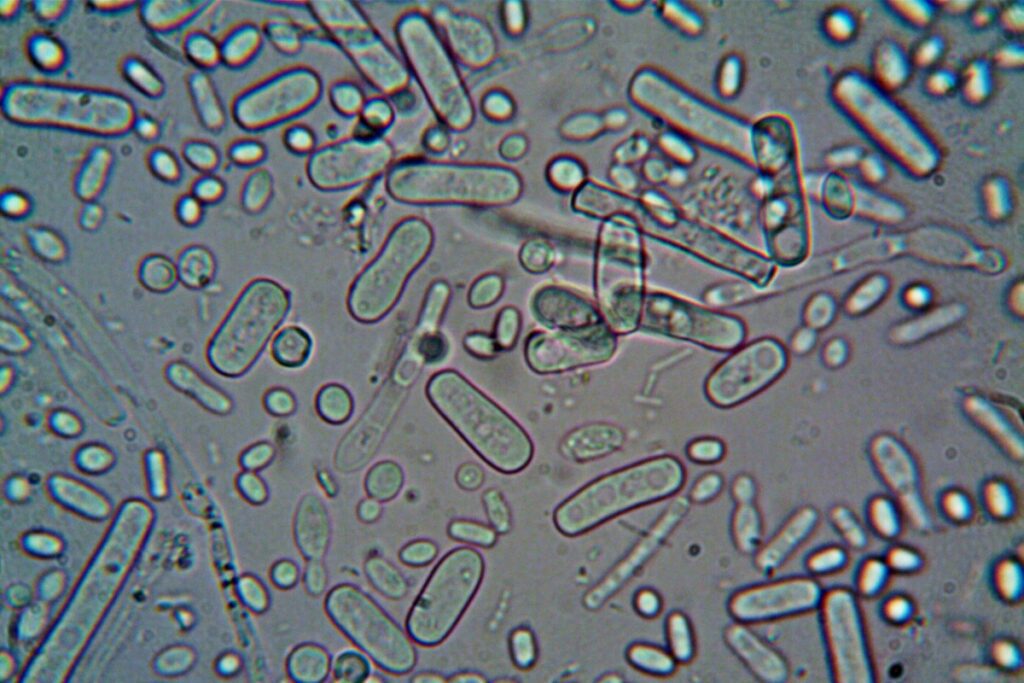A strong, fishy vaginal odor isn’t normal and can often indicate an underlying issue. One of the most common causes is bacterial vaginosis (BV), a condition that affects many young women and is notorious for recurring.
In this article, we will cover everything related to fishy and foul vaginal odors, and explain what steps you should take.
Your Cheat Sheet
- Fishy odor is often caused by bacterial vaginosis (BV).
- If symptoms persist for more than a week, see a doctor.
- Practice safe sex or avoid sex completely until symptoms subside.
- Avoid douching or scented products to prevent irritation.
- Eat probiotic-rich and fermented foods to boost your immunity.
- Wash with plain warm water and keep your down there dry.
Why Do I Have a Fishy Smell?

At different times, a woman’s vagina can have different smells. If the smell becomes strong and noticeable — such as being able to smell yourself through your pants — it might be a sign that something is off.
First, let’s dive into the anatomy. The fishy smell comes from inside the vagina, not the vulva or urine.
While the smell might seem to linger on the vulva, it originates deeper within the vagina, making internal treatments necessary to restore balance.
The most common culprit of a fishy smell is bacterial vaginosis (BV), a condition where the natural balance of bacteria in your vagina is disrupted.
The vagina has its own ecosystem of bacteria, called microflora, which maintains a healthy balance. When this balance is disrupted—often by stress, pH changes, or infections—”bad” bacteria multiply, producing a noticeable odor. Fishy and foul smell is a common symptom of BV.
Bacteria Behind the Fishy Smell

The fishy odor in bacterial vaginosis is caused by an overgrowth of certain bacteria, especially Gardnerella vaginalis.
Gardnerella vaginalis releases amines, which are compounds that produce a strong, fishy smell, especially after activities like sex or during menstruation.
This overgrowth happens when the “good” bacteria, primarily Lactobacillus, decline, allowing the “bad” bacteria to thrive.
Common Causes of Bacterial Vaginosis
According to the American Sexual Health Association, 29% of women aged 15-44 in the U.S. experience BV at some point. That makes over 21 million women only in the United States.
Why do I have a fishy smell? you might ask. There are multiple reasons behind BV.
Here is a list of the most common ones:
1. Unprotected Sex
BV isn’t a sexually transmitted disease (STI), it’s classified as vaginal infection.
We don’t exactly know what causes BV, but it seems to happen more often in people who are sexually active.
Unprotected sex can introduce new bacteria into the vagina and disturb the natural balance. Sperm and various external bacteria can affect the vaginal flora and contribute to BV.
It all comes down to the pH level. The normal vaginal pH ranges between 3.8 and 5.0, which is moderately acidic. However, seminal fluid is slightly alkaline, with a pH between 7.2-7.4.
2. Use of Scented Products During Sex
Using lubricants with added fragrances or harsh chemicals can irritate the vagina and alter its natural bacteria balance.
Some lubricants can contribute to BV by disrupting the natural pH and creating an environment for harmful bacteria to thrive.
4. Douching and the Use of Scented Products
The vagina is self-cleaning, and introducing harsh chemicals can kill beneficial bacteria.
Let’s get it straight – douching is bad for your vaginal health. Douching and using scented soaps or sprays and intimate washes disturb the natural pH balance of the vagina.
The same goes for scented tampons and pads. Using these products increases the likelihood of developing BV by altering the environment where healthy bacteria thrive.
4. Chronic Stress
Stress that has been ongoing for a longer period has also been found to lead to recurring BV.
A 2006 study found that stress not only more than doubled the likelihood of developing BV but also increased the chances of new BV cases by 29%.
Stress weakens the immune system, making it harder for the body to maintain a healthy vaginal microflora. This disruption allows “bad” bacteria to flourish.
5. Trichomoniasis
Trichomoniasis is a STI caused by a parasite that can also lead to vaginal infections, including BV.
Having multiple infections at once can worsen symptoms and make treatment more complex. Thichomoniasis requires immediate testing and treatment.
6. Poor Hygiene
Poor hygiene practices usually are not the main cause of BV, but they can worsen BV symptoms such as the fishy smell.
Practices such as not washing the genital area regularly or wearing tight, non-breathable clothing, can create a warm, moist environment where harmful bacteria thrive.
Sweat, excess moisture, and bacteria trapped in tight clothing can trigger BV symptoms, particularly during hot weather or after exercise. Read more about habits that make it hard to improve vaginal health.
Steps to Get Rid of the Smell

Since the fishy smell comes from inside of the vagina, you cannot get rid of the smell by using scented pads or underwear (and it is strongly recommended against!).
You need to treat the symptoms from their root cause. If you suspect BV, it’s important to follow these steps:
1. Consult an OB/GYN
First and foremost, it’s crucial to see a doctor for a proper diagnosis.
A gynecologist will test you for bacterial infections, including BV, and recommend the best treatment, whether it’s antibiotics, boric acid suppositories, probiotics to restore healthy bacteria, or other therapies.
2. Take a Vaginal pH Test
A pH test can help determine if there is an imbalance in your vaginal flora, which is often the case with BV.
A vaginal pH test is easy to use, and you can take a pH test at home at your convenience.
3. Be Careful With Sex
If you think you have BV, it’s best to avoid sex or use condoms until it clears up. However, the fishy smell is usually unpleasant enough to naturally reduce your desire for sex.
If you still have sex after being diagnosed with or suspecting BV, there are some things you should keep in mind:
Practice safe sex and use condoms
Avoid introducing your partner’s genital secretion (vagina or penis) to your vagina. You don’t want to expose your already unbalanced vaginal microbiome to your partner’s bacteria and too alkaline semen. Condoms are the most efficient protection for bacteria and sexually transmitted diseases (STIs).
Avoid getting your partner’s saliva in your vagina
Your partner’s mouth contains various bacteria that can irritate your vaginal area. If you have BV, it’s best to avoid any bacteria that do not belong to your vagina. Use your body’s natural lubrication or water-based lubricants.
Careful with switching from anal to vaginal sex!
Switching between anal and vaginal sex without cleaning up can move bacteria from your anus to your vagina, increasing the risk of BV. Change condoms every time.
Pee straight after sex
Peeing after sex helps flush out bacteria that may have entered the urethra during intercourse, thus also reducing the risk of urinary tract infections (UTIs).
Wash every time after sex
Gently rinsing the vulva with clean water after sex can help remove any residue or bacteria that may have accumulated.
4. Practice Good Hygiene
Keep the area clean with warm water only (avoid soaps, sprays, or douching).
Wear breathable cotton underwear and change out of wet clothing promptly to maintain a healthy vaginal environment.
5. Take Care of Your Mental and Physical Health
Stress can contribute to BV, so managing stress and improving your overall health through a balanced diet, exercise, and sleep can help prevent future occurrences.
Can I Get Rid of Smelly Discharge at Home?
Many women are tempted to solve the fishy smell on their own. While some home remedies help with BV symptoms, others can be ineffective and potentially be harmful.
Yogurt
Eating probiotic-rich foods such as plain unsweetened yogurt or kefir daily has proven to be effective with vaginal infections.
However, soaking a tampon in kefir or yoghurt, on the other hand, hasn’t had any proven positive effects on fighting with BV.
Garlic
Some sources advise inserting garlic gloves directly into vagina. We strongly advise against it – inserting garlic can cause burns, irritation, and even infections.
Garlic supplement tablets, on the other hand, are recommended since they have proven to have therapeutic effects.
Douching
Avoid douching altogether. Douching with baking soda, tea tree oil or apple cider vinegar can cause irritation, burning, and allergic reactions, and potentially making the infection worse.
You should also avoid douching with a solution made with baking soda, tea tree oil or apple cider vinegar.
Over-the-counter solutions
Over-the-counter solutions sold in pharmacies, such as boric acid vaginal suppositories, probiotic and prebiotic vaginal suppositories, are generally considered safe and have been shown to help alleviate BV symptoms in many cases.
To sum up, we do not recommend inserting anything in your vagina that is not a) prescribed by a qualified physician, b) sold by a licensed pharmacist or c) recommended by an authoritative source with scientific proof.
When to Seek Medical Help
See your doctor if:
- Symptoms persist for more than a week.
- You notice pain, swelling, or unusual discharge.
- Over-the-counter remedies don’t work.
- You are pregnant.
Conclusion
A fishy vaginal odor is often caused by bacterial vaginosis (BV), which results from an imbalance in vaginal bacteria. It occurs in case of overgrowth of certain bacteria, especially Gardnerella vaginalis.
If symptoms persist for more than a week, you should see a doctor or visit an ob/gyn to get a proper treatment plan. In the meantime, practice safe sex or avoid sex completely until the symptoms subside, maintain good hygiene, use proven over-the-counter treatments, eat probiotic-rich foods, and avoid douching.
FAQ
How do I get rid of the fishy smell fast?
If your symptoms have lasted more than a week, you should see an ob/gyn for proper treatment. BV is usually treated with antibiotics, boric acid suppositories, and supported with probiotics.
Avoid scented products and sex, or practice safe sex, and keep the area clean with plain water.
How do you get rid of BV smell overnight?
It’s unlikely to fully resolve overnight. In the case of BV, it’s best to consult a doctor for proper treatment.
To alleviate fishy smell, you can wash yourself with lukewarm water as needed and support with proven over-the-counter solutions such as probiotics. If symptoms are severe, avoid sex. It can worsen the imbalance and intensify the odor.
How do I make my private area not smell like fish?
Address the root cause, such as BV. Practice good hygiene, wear breathable underwear, and avoid scented products.
How to get rid of smelly discharge naturally at home?
Focus on probiotics, a balanced diet, and good hygiene. Avoid douching or home remedies like garlic or baking soda, which can worsen symptoms.
Why do I smell fishy down there after sex?
Sex can disrupt your vaginal pH, making BV symptoms worse. Avoid sex if possible or use protection, and avoid using scented lubricants or douches.
I have yeast infection and bacterial vaginosis at the same time, what should I do?
It’s quite common to have yeast infection and BV at the same time, especially in recurrent cases. Sometimes one causes the other to return and they need to be treated by a specialist.
After diagnosis, your doctor will most likely prescribe you separate medications like antifungals (like Fluconazole) for yeast and antibiotics (like Metronidazole) or boric acid suppositories for BV. Start taking probiotics as soon as you experience those symptoms.
TL;DR
- Fishy odor is often caused by bacterial vaginosis (BV).
- If symptoms persist for more than a week, see a doctor.
- Practice safe sex or avoid sex completely until symptoms subside.
- Avoid douching or scented products to prevent irritation.
- Eat probiotic-rich and fermented foods to boost your immunity.
- Wash with plain warm water and keep your down there dry.



